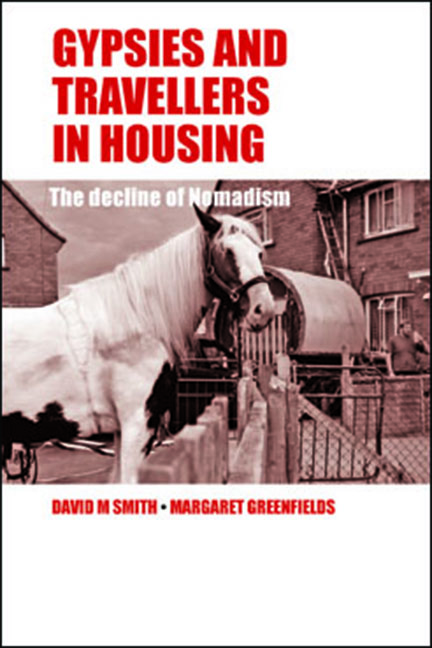Book contents
- Frontmatter
- Contents
- List of tables
- Acknowledgements
- Foreword
- one Introduction
- two Space, surveillance and modernity
- three Gypsies, nomads and urbanisation: a social history
- four The research sites and population sample
- five Routes into housing
- six Housing transitions
- seven Gypsies, Travellers and gorjers: conflict and cooperation
- eight Recreating community
- nine Young people in housing: aspirations, social relations and identity
- ten Conclusion
- Appendix A Methodologies
- Appendix B Glossary of words and terms
- References
- Index
nine - Young people in housing: aspirations, social relations and identity
Published online by Cambridge University Press: 03 February 2022
- Frontmatter
- Contents
- List of tables
- Acknowledgements
- Foreword
- one Introduction
- two Space, surveillance and modernity
- three Gypsies, nomads and urbanisation: a social history
- four The research sites and population sample
- five Routes into housing
- six Housing transitions
- seven Gypsies, Travellers and gorjers: conflict and cooperation
- eight Recreating community
- nine Young people in housing: aspirations, social relations and identity
- ten Conclusion
- Appendix A Methodologies
- Appendix B Glossary of words and terms
- References
- Index
Summary
This chapter draws predominantly on two focus groups conducted in the South East and South West research sites in addition to data gleaned from secondary analysis of GTAA focus groups and household interviews conducted in the primary research locales. It explores the experiences of young housed Gypsies and Travellers (aged 25 or less) and the evolving nature of spatially bounded social relationships among these youthful cohorts, for many of whom life in conventional housing has been their predominant experience. The chapter focuses on the dynamics of intercommunity and interpersonal relations and discusses how an increasing social and cultural convergence with non-Traveller youth generates generationally specific understandings of Gypsy/Traveller identity as well as intergenerational divergences in those conceptualisations. These differences predominantly coalesced around notions of collective identity; the differing emphasis placed on the symbolic role of nomadism; in attitudes surrounding intergroup relationships and the importance placed on boundary maintenance and corresponding perceptions of ‘authenticity’ (see further Chapter Six). The timing and intersection of radical social transformations (such as the move from nomadism towards settlement) and generation-specific attitudes are central to understanding the tension that emerges between older cultural precepts and an emergent youth culture more attuned to new social circumstances (Sztompka, 2000).
Under such conditions new solidarities and identities develop, which express two contradictory forces: inter-generational conflict, in addition to a simultaneous desire for identification and continuity with the parent culture (Smith, 2005). Edmunds and Turner (2002, p 6) argue that a ‘sociology of generations’ and of generational consciousness must begin with the historical context and shared experiences through which that consciousness was formed. Such a perspective was utilised by the Birmingham Centre for Contemporary Cultural Studies (CCCS) in their analyses of post-war working-class youth culture, and is relevant to a fuller understanding of how the undermining of nomadic traditions and the transplanting of Gypsies and Travellers into housing is mediated by both gender and age-cohort. Collective responses and adaptations to external change are differentiated on the basis of both, whilst still retaining an overall adherence to more generalised shared values and worldviews. As Clarke et al (1993) note:
Here we begin to see how forces, working right across a class, but differentially experienced as between the generations, may have formed the basis for generating an outlook – a kind of consciousness – specific to age position: a generational consciousness. (Clarke et al, 1993, p 51)
- Type
- Chapter
- Information
- Gypsies and Travellers in HousingThe Decline of Nomadism, pp. 175 - 196Publisher: Bristol University PressPrint publication year: 2013



